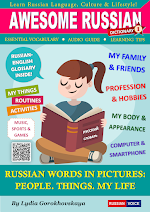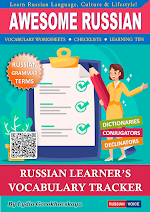Building your Russian vocabulary helps strengthen speaking, reading, and writing skills. When you keep a journal of newly discovered words, you can watch your vocabulary grow. That’s why I created Awesome Russian Learner’s Vocabulary Tracker for my students. With its help, you will organize your Russian vocabulary and get to know how to learn Russian words, verbs, and phrases effectively.
Awesome Russian Learner’s Vocabulary Tracker is a PDF workbook with 70 vocabulary worksheets and checklists. It will help you keep the words you are learning, to look back and reference past vocabulary words.
You can print it out and write Russian words and phrases that you learn at your Russian language classes, while using Duolingo, Memrise or other Russian learning apps, watching YouTube videos, listening to podcasts or reading your Russian textbook. You will also practice declination of nouns and conjugation of verbs.
This workbook also includes:
- Russian grammar terms;
- links to Russian online dictionaries and useful resources;
- links to Russian online conjugators and declinators;
- Russian vocabulary learning tips.
Let’s see how to use Awesome Russian Learner’s Vocabulary Tracker to organize your Russian vocabulary.
Step 1. Print your workbook in color or black and white. Use a stapler to make holes in the sheets. Paste them into a binder folder.
Step 2. Divide your notebook into sections using dividers. You can buy them at a stationery store or make your own from thick paper. Write the names of the sections on the stickers:
1. Существительные. Nouns
2. Падежи. Cases
3. Глаголы. Verbs
4. Прилагательные. Adjectives
5. Наречия. Adverbs
6. Союзы. Conjunctions
7. Фразы. Phrases
You can print more sheets if you need to write more words. At the beginning of each section, there are useful tips to help you learn nouns, adjectives, and verbs effectively. There is also a template with examples showing how to spell words correctly.
Section 1. Существительные - Nouns
Nouns are words that name people, objects, and abstract phenomena. It’s better to learn nouns by topics. For example, "Семья - Family", "Вещи -Things", "Продукты – Products/Food", "Овощи - Vegetables", "Фрукты - Fruits", "Транспорт - Transport".
You can choose one or more templates to write nouns.
- Существительные > слово, род, перевод, рисунок. Nouns > word, gender, translation, picture (Vocabulary Worksheet with Examples + Blank Worksheet)
- Существительные > слово, род, перевод. Nouns > word, gender, translation (Vocabulary Worksheet with Examples + Blank Worksheet)
- Существительные > слово, перевод, дефиниция. Nouns: word, translation, definition (Vocabulary Worksheet with Examples + Blank Worksheet)
I’ve also created a template 10 days of Russian words with vocabulary learning tips. You can use it to organize a vocabulary challenge. It's fun and exciting!
Each template has a place for examples. You can write them out of the textbook or make up your own. Be sure to indicate a gender of a Russian word. You can write a translation of a word into your language, draw a picture or come up with a definition (describe or explain the word in your own words).
The template История. Story is a place where you can write a short story with new words. This is a super effective method to help you use new words in context and memorize them quickly.
For example, you can write about your family and friends, tell about your hobbies and interests, describe your favorite books, movies, places, and food. You can write about your daily routines, create to-do or things to buy lists, and many more.
Section 2. Падежи - Cases
During your Russian lessons at a language school or a university, you will learn how to use Russian cases. There are special templates in the workbook where you can write the rules and examples.
Here they are!
- Именительный падеж > как использовать, примеры. Nominative Case > how to use, examples (Blank Worksheet)
- Родительный падеж > как использовать, примеры. Genitive Case > how to use, examples (Blank Worksheet)
- Дательный падеж > как использовать, примеры. Dative Case > how to use, examples (Blank Worksheet)
- Винительный падеж > как использовать, примеры. Accusative Case > how to use, examples (Blank Worksheet)
- Творительный падеж > как использовать, примеры. Instrumental Case > how to use, examples (Blank Worksheet)
- Предложный падеж > как использовать, примеры. Prepositional Case > how to use, examples (Blank Worksheet)
You will also find the template Какой предлог? Какой падеж? > предлог, перевод, падеж, пример. What Preposition? What Case? > preposition, translation, case, example. Here you can make a list of prepositions that we use with a certain case.
Склонение существительных. Noun declension
Noun declension is a very important topic of Russian grammar. There is a template Существительные. Склонение. Nouns. Declension, where you can write the declension of important words and write examples.
Section 3. Фразы - Phrases
It’s very important to learn Russian phrases right from the start. In the section Фразы. Phrases you can write Russian phrases, questions and answers, idioms and proverbs. Since you will learn many Russian phrases, you can print 5 to 10 sheets at once.
There are special templates for this in the workbook.
- Вопросы. Questions (Worksheet with Examples + Blank Worksheet)
- Вопросы и ответы. Questions & Answers (Worksheet with Examples + Blank Worksheet)
- Пословицы. Proverbs (Worksheet with Examples + Blank Worksheet)
- Идиомы. Idioms (Worksheet with Examples + Blank Worksheet)
You can use Russian phrases you learn to create dialogues and stories. For example, you can write a story about shopping. You will need a word list on the topics "Food" and "Money", as well as phrases on the topic "In the store".
Also in the workbook, there is a template for 10 дней новый русских фраз. 10 Days of New Russian Phrases. You can use it to arrange Russian phrases challenges.
Section 4. Прилагательные. Adjectives
We use adjectives to describe people and things. There are several templates in the workbook to help you study and memorize them effectively.
- Прилагательные > прилагательное, антоним, перевод. Adjectives > Adjective, Antonym, translation (Worksheet with Examples + Blank Worksheet)
- Прилагательные > прилагательное и существительное, синоним, антоним, примеры. Adjectives > Adjective and Noun, Synonym, Antonym, examples (Worksheet with Examples + Blank Worksheet)
- Прилагательные > прилагательное и существительное, сравнительная степень, превосходная степень, примеры. Adjectives > Adjective and Noun, Comparative, Superlative, examples (Worksheet with Examples + Blank Worksheet)
In Russian, we decline adjectives. For this purpose, I also made a special template Прилагательное. Склонение. Adjectives. Declension. I recommend printing it in several copies.
Section 5. Глаголы - Verbs
In order to speak Russian correctly, we need to know how to conjugate verbs. There are two types of verb conjugations and Imperfective and Perfective aspects. Use the following templates to learn the Russian verbs effectively.
- Как учить глаголы. How to Learn Verbs (Learning Tips + Checklist)
- Глаголы (НСВ). Группа 1. Imperfective Verbs. Group 1 (Worksheet with Examples + Blank Worksheet)
- Глаголы (СВ). Группа 1. Perfective Verbs. Group 1 (Worksheet with Examples + Blank Worksheet)
- Глаголы (НСВ). Группа 2. Imperfective Verbs. Group 2 (Worksheet with Examples + Blank Worksheet)
- Глаголы (СВ). Группа 2. Perfective Verbs. Group 2 (Worksheet with Examples + Blank Worksheet)
- Imperfective Verb Conjugation (Worksheet with Examples + Blank Worksheet)
- Perfective Verb Conjugation (Worksheet with Examples + Blank Worksheet)
Section 6. Наречия - Adverbs
Adverbs are words that describe verbs. It is also useful to write them down in your dictionary. Use adverbs to form phrases with verbs. Print out the template Наречия. Adverbs to write new words and examples.
Section 7. Союзы - Conjunctions
To write Russian sentences correctly, we need conjunctions and linking words. Write them down in a special template Союзы. Conjunctions.


















